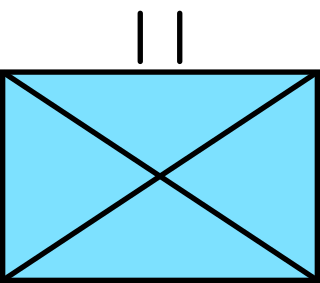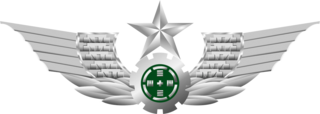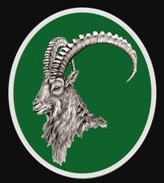
A battalion is a military unit, typically consisting of 300 to 1,000 soldiers commanded by a lieutenant colonel, and subdivided into a number of companies. The typical battalion is built from three operational companies, one weapons company and one HQ company. In some countries, battalions are exclusively infantry, while in others battalions are unit-level organisations.

A regiment is a military unit. Its role and size varies markedly, depending on the country, service, or specialisation.

A section is a military sub-subunit. It usually consists of between 6 and 20 personnel. NATO and U.S. doctrine define a section as an organization "larger than a squad, but smaller than a platoon." As such, two or more sections usually make up an army platoon or an air force flight.

The Northern Light Infantry Regiment (NLI) is a light infantry regiment in the Pakistan Army, based and currently headquartered in Gilgit, Pakistan. Along with other forces of the Pakistani military, the NLI has the primary responsibility of conducting ground operations in the interest of defending the strategically-important territory of Gilgit−Baltistan, a Pakistani-controlled region that constitutes part of Kashmir, which has been disputed between Pakistan and India since 1947. The NLI draws a majority of its recruits from native tribes present in the nearby mountainous areas who are reportedly less prone to altitude sickness and the cold temperatures that characterize high-altitude mountain warfare, allowing the regiment to conduct its duties optimally.

The North-West Frontier was a region of the British Indian Empire. It remains the western frontier of present-day Pakistan, extending from the Pamir Knot in the north to the Koh-i-Malik Siah in the west, and separating the modern Pakistani frontier regions of North-West Frontier Province, Federally Administered Tribal Areas and Balochistan from neighbouring Afghanistan in the west. The borderline between is officially known as the Durand Line and divides Pashtun inhabitants of these provinces from Pashtuns in eastern Afghanistan.

The People's Liberation Army Ground Force is the land-based service branch of the People's Liberation Army and the largest and oldest branch of the entire Chinese armed forces. The PLAGF can trace its lineage from 1927 as the Chinese Red Army; however, it was not officially established until 1948.

A rifleman is an infantry soldier armed with a rifled long gun. Although the rifleman role had its origin with 16th century hand cannoneers and 17th century musketeers, the term originated in the 18th century with the introduction of the rifled musket. By the mid-19th century, entire regiments of riflemen were formed and became the mainstay of all standard infantry, and rifleman became a generic term for any common infantryman.

A rifle regiment is a military unit consisting of a regiment of infantry troops armed with rifles and known as riflemen. While all infantry units in modern armies are typically armed with rifled weapons the term is still used to denote regiments that follow the distinct traditions that differentiated them from other infantry units.
The Frontier Corps, are a group of paramilitary forces of Pakistan, operating in the provinces of Balochistan and Khyber Pakhtunkhwa, to maintain law and order while overseeing the country's borders with Afghanistan and Iran. There are four Frontier Corps: FC KPK (North) and FC KPK (South) stationed in Khyber Pakhtunkhwa province, and FC Balochistan (North) and FC Balochistan (South) stationed in Balochistan province.

The Corps of Guides was a regiment of the British Indian Army made up of British officers and Indian enlisted soldiers to serve on the North West Frontier. As originally raised in 1846, The Guides consisted of infantry and cavalry. It evolved through the 20th century to become the Guides Cavalry and Guides Infantry. Once independence was granted to India and after the partition, The Guides were given over to Pakistan and became part of the Pakistan Army with all ranks including officers being recruited solely from Pakistan.
A field force in British and Indian Army military parlance is a combined arms land force operating under actual or assumed combat circumstances, usually for the length of a specific military campaign. It is used by other nations, but can have a different meaning.
On 25 March 1971, the Pakistani military, supported by paramilitary units, launched the military operation to pacify the insurgent-held areas of East Pakistan, which led to a prolonged conflict with the Bengali Mukti Bahini. Although conventional in nature during March–May 1971, it soon turned into a guerrilla insurgency from June of that year. Indian Army had not directly supported the Bengali resistance but had launched Operation Jackpot to support the insurgency from May 1971.
The Kharan Rifles is a paramilitary regiment forming part of the Pakistani Frontier Corps Balochistan (South). It is responsible for border security, counter-insurgency, and maintaining law and order in southwest Pakistan. It guards the border area at the junction of Pakistan, Iran and Afghanistan, a major transit area for trade and traffic. Administratively the regiment comes under the Interior Ministry, while it is commanded by seconded officers of the Pakistan Army.

The L1A1 Self-Loading Rifle (SLR), also known by the initial Canadian designation C1, or in the U.S. as the "inch pattern" FAL, is a British version of the Belgian FN FAL battle rifle. The L1A1 was produced under licence and adopted by the armed forces of the United Kingdom, Australia, Canada, India, Jamaica, Malaysia, New Zealand, Rhodesia and Singapore.

The Gilgit−Baltistan Scouts, are a civil armed force of Pakistan, tasked with law enforcement in the nominally autonomous territory of Gilgit-Baltistan and border guard duties. The force was formed in 2003 under the control of the Interior Ministry of Pakistan, but it claims a tradition dating back to the Gilgit Scouts formed during the British Raj era. However, the earlier Scouts unit is now a full infantry regiment of the Pakistan Army (see Northern Light Infantry Regiment, which mostly operates in the same region as the current Scouts.

The Civil Armed Forces (CAF) are a group of nine paramilitary, uniformed organisations, separate and distinct from the regular "military" Pakistan Armed Forces. They are responsible for maintaining internal security, helping law enforcement agencies, border control, counter-insurgency and counter-terrorism, riot control, and anti-smuggling under the Ministry of Interior. They frequently operate alongside the Pakistani military in response to natural disasters. They come under the direct command of the Ministry of Defence and the Pakistani military during wartime.
The Frontier Corps Balochistan (South) (Urdu: فرنٹیئر کور بلوچستان (جنوبی), reporting name: FCB(S)), is a group of paramilitary forces of Pakistan, operating in the southwestern part of the province of Balochistan, to overseeing the country's borders with Afghanistan and Iran and assist with maintaining law and order. It is one of four Frontier Corps with the others being: FC Khyber Pakhtunkhwa (North) and FC Khyber Pakhtunkhwa (South) stationed in Khyber Pakhtunkhwa province, and FC Balochistan (North) stationed in the northern part of Balochistan province.
The Frontier Corps Balochistan (North) (Urdu: فرنٹیئر کور بلوچستان (شمالی), reporting name: FCB(N)), is a group of paramilitary regiments of Pakistan, operating in the northern part of the province of Balochistan, to overseeing the country's borders with Afghanistan and assisting with maintaining law and order. It is one of four Frontier Corps with the others being: FC Khyber Pakhtunkhwa (North) and FC Khyber Pakhtunkhwa (South) stationed in Khyber Pakhtunkhwa province, and FC Balochistan (South) stationed in the southern part of Balochistan province.
The Frontier Corps Khyber Pakhtunkhwa (South) (Urdu: فرنٹیئر کور خیبر پختونخواہ (جنوبی), reporting name: FCKP(S)), is a group of paramilitary regiments of Pakistan, operating in the southern part of Khyber Pakhtunkhwa province, to overseeing the country's borders with Afghanistan and assisting with maintaining law and order. It is one of four Frontier Corps with the others being: FC Khyber Pakhtunkhwa (North) stationed in the north of Khyber Pakhtunkhwa province, and FC Balochistan (North) and FC Balochistan (South) stationed in Balochistan province.
The Frontier Corps Khyber Pakhtunkhwa (North) (Urdu: فرنٹیئر کور خیبر پختونخواہ (شمالی), reporting name: FCKP(N)), is a group of paramilitary regiments of Pakistan, operating in the northern part of Khyber Pakhtunkhwa province, overseeing the country's borders with Afghanistan and assisting with maintaining law and order. It is one of four Frontier Corps with the others being: FC Khyber Pakhtunkhwa (South) stationed in the south of Khyber Pakhtunkhwa province, and FC Balochistan (North) and FC Balochistan (South) stationed in Balochistan province.











